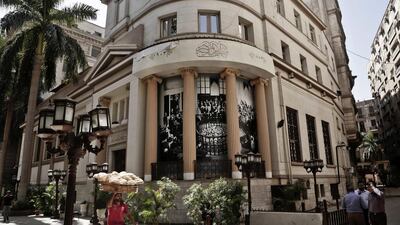The Egyptian economy is under enormous pressure. For the government to finalise a US$12 billion loan deal, it will have to take measures to devalue its official exchange rate and remove caps on fuel prices.
No doubt the economy needs to be rebalanced after five long years since the 2011 uprising. The government faces large budget and current account deficits (almost 12 per cent and 7 per cent of GDP, respectively) as Egypt’s foreign reserves run dangerously low. Unemployment is at 12 per cent. Egypt’s inflation rate has been 14 per cent or higher since this summer, levels not seen for more than a decade.
The dollar trades on the black market at a more than 75 per cent premium to the official rate. So the government has tried to keep dollars in Egypt by, for example, limiting bank withdrawals. The demand for dollars has outpaced supply because of steep drops in tourism and foreign investment, key sources of hard currency. Fixing the currency will not be easy if the supply of currency is not addressed.
It is expected that the official currency will weaken from its current level of 8.80 to at least 13 upon completion of the loan deal. The only solution to the currency problem would be to move the Egyptian pound to a managed floating system from its current rigid system as long as there is enough backing by inflows of concessional foreign exchange. And as the official currency weakens further, inflation is set to rise as well. Authorities have been stockpiling key commodities, including fuel and sugar, to safeguard against possible price gouging.
Although it would be hugely unpopular, the authorities would have to make spending cuts. Civil service reform, cutting back on public sector salaries and reduced fuel subsidies will have to be tackled. Structural reform designed to boost productivity and investment and accelerate a wider development agenda centred on building out Egypt’s service sector (trade and tourism), manufacturing and industrial base, and agricultural capacity are essential to growth.
It seems that the worst for the tourism industry is behind it despite the crisis it went through over the past year. The country’s revenues from tourism dropped by 49 per cent to $3.8bn in 2015-16 from $7.4bn in 2014-15, the central bank of Egypt reported last month.
Attracting international investments would necessitate a change in the business environment. Doing business is still stifling and much can be accomplished if red tape is reduced. Egypt is 131st in the World Bank’s ease-of-doing-business ranking. An investor must get permits from 78 official bodies to start a project, according to the government.
Attracting new industries and business will require increasing incentives in an environment of higher energy costs. The Suez Canal Special Economic Zone could become an attraction for industry with fewer regulations and lower taxes than the rest of Egypt, along the canal. To date, few companies have signed up to join the zone – perhaps because of the government’s decision to raise the corporate income tax rate, even in special economic zones, from 10 per cent to 22.5 per cent.
In comparison, at Dubai’s Jebel Ali port, companies pay no tax for 50 years. Egypt’s parliament in August passed a law on value added tax, one of the reforms promised in exchange for the IMF loan, to be set at 13 per cent for 2016-17 and 14 per cent for the following fiscal year. The VAT replaces a sales tax of 10 per cent, although the government says about 50 services and products will be exempt, including bread. It could be that expected revenues from a VAT tax increase end up disappointing.
Egypt is too important to fail. The agreement with the IMF is likely to move forward, and aid from some of the Gulf states will flow in. Egypt has muddled through in the past, but the brunt of the population will now feel more pain over the short term. Politicians will have to be convincing on why reforms are tough but unavoidable.
John Sfakianakis is the director of economic research at the Gulf Research Centre in Riyadh.
business@thenational.ae
Follow The National's Business section on Twitter

